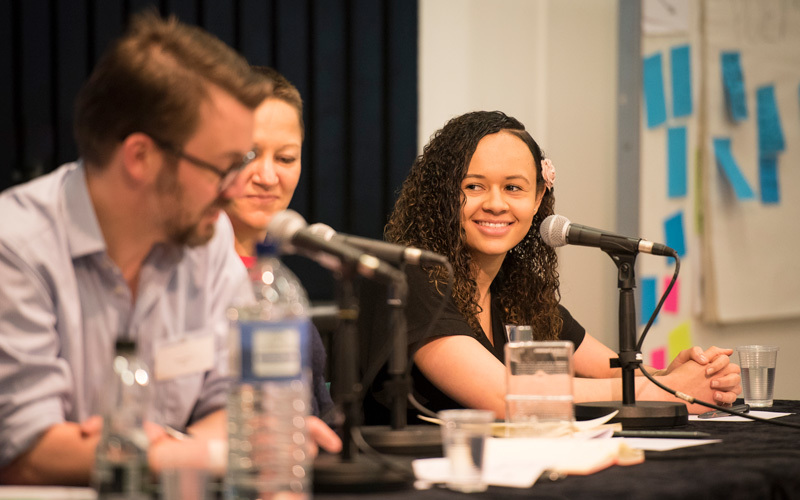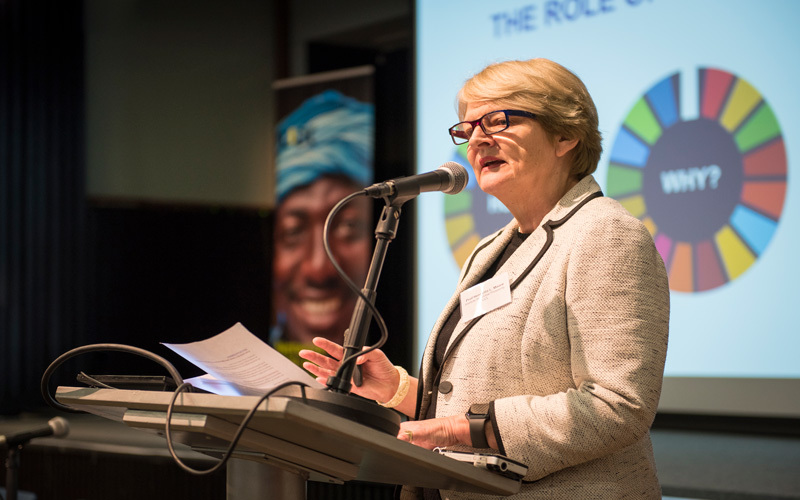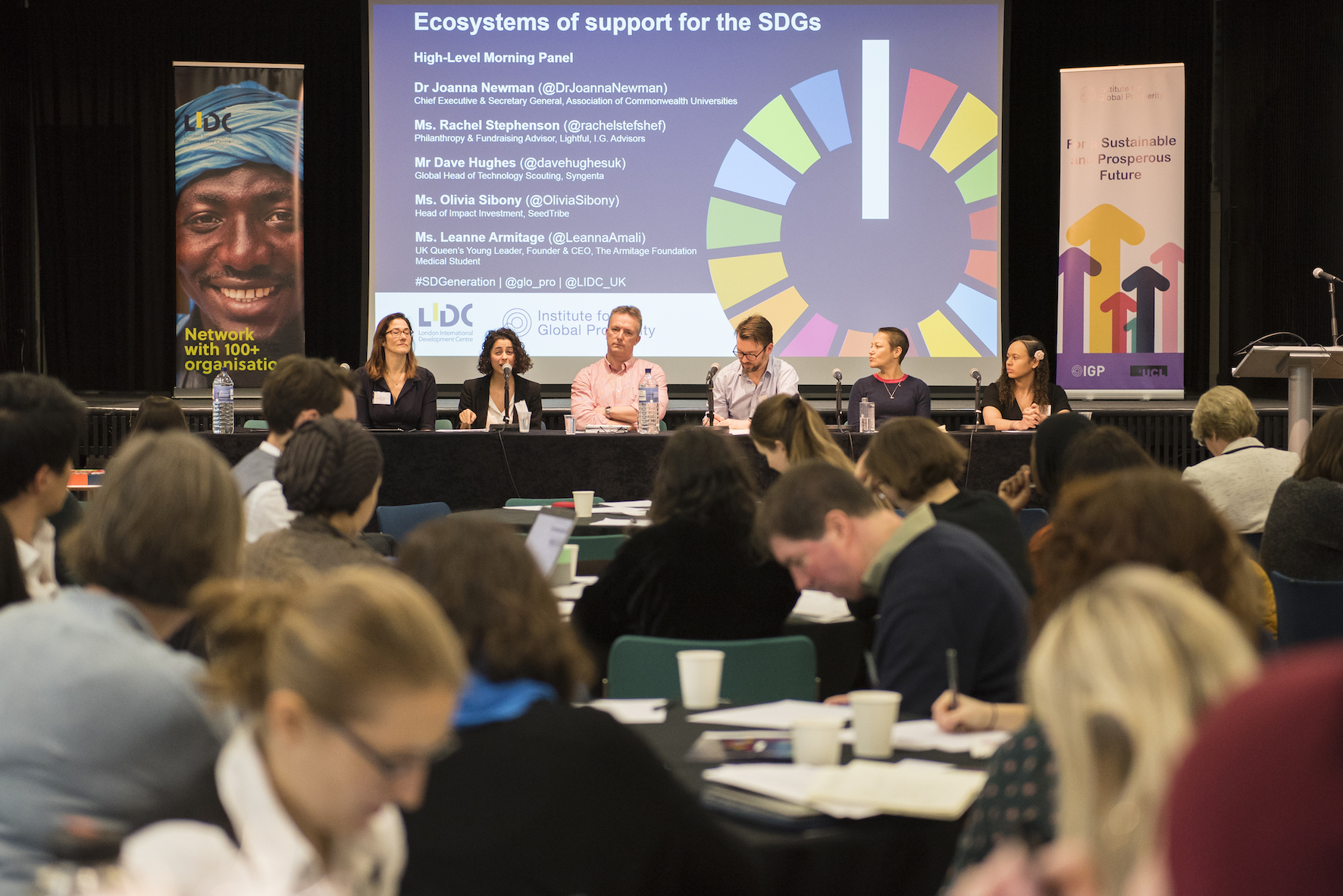David Bent
In mid-February I chaired an all-day conference on the "SDGeneration - A Citizen Science Movement". My main reflection is how taking part in knowledge creation is a vital part of having agency in an overwhelming world, and a route to mobilising young people.

David Bent, Senior Visiting Researcher at the Institute for Global Prosperity, writes for the IGP.
On Wednesday 13 February, the Institute for Global Prosperity (IGP), University College London, and London International Development Centre (LIDC) brought together an amazing event, centred on engaging young people as a largely untapped resource that can help us progress on sustainable development, and in particular the Sustainable Development Goals (SDGs). I was MC, and here are my reflections, organised by the aims of the conference.
How universities can engage students and communities to deliver on the SDGs
People at the conference were clear that students and young people were already motivated and acting for change. As Professor Claire Heffernan put it, they are "Generation Justice", where many have an attitude which inverts the Serenity Prayer:
"I am no longer accepting what I cannot change; I am changing what I cannot accept".
Therefore, universities don't need to convince students of the need. Instead, the role of universities is enabling and supporting students as they act.
But, as Professor Henrietta Moore argued, this would require a new social contract between universities and society, one that fits our current times.
Therefore, universities don't need to convince students of the need. Instead, the role of universities is enabling and supporting students as they act.
But, as Professor Henrietta Moore argued, this would require a new social contract between universities and society, one that fits our current times.
Now, the institution of the 'university' has been around for many centuries, which shows how important their role is in society. Knowledge has always been a strategic asset, and learning a strategic function, of successful societies.
An urgent round of institutional innovation is needed, so that universities support the mode of knowledge production that fits with societies' needs now and over the coming decades. The thrust of the conference was that delivering on the SDGs requires a profound transformation - and so that must be the focus of the knowledge assets and learning processes that universities support.
Universities need to foster a diversity of attempts to vision a sustainable world, and a variety of experiments to create pathways in that direction.
That will mean shifting some of the current foundational assumptions of universities, for instance that knowledge production is neutral, objective and a task for experts, who carry out research on people. Instead, I would argue knowledge production is context-specific, affects who has power and should be with the people affected. Therefore, every research choice is a political act.
The implication is that universities have to be one source of the requisite variety needed for the dominant political economies to change. Those who want to maintain the status quo will object to this (small 'p') political role. They need to show that incremental improvements will be sufficient to reach the SDGs, or that there are other sources of vareity they are willing to support.
Even so, if universities can incubutate the seeds of a better tomorrow, then they will engage young people.
A citizen-science approach to implementing and monitoring progress on the SDGs
The conference heard many different citizen science activities, from African agriculture through Columbian forest protection and processing astronomical physics to understanding people's lived experience of a good life in London.
So, citizen science is an established tool in the research methods box. Like any research method, it has strengths and related weaknesses. The position of the conference was that there is no single objective fact about a situation; there are different insights from different methods, and each have their own texture and flavour.
In the case of citizen-science, the involvement of people in knowledge production is a strength for implementing the SDGs (while making claims on universal knowledge are more difficult).
In particular, over the last few decades many people in the West have felt that they are the objectives of creative destruction. The forces of globalisation and technological innovation have flowed through their communities, washing away jobs, status and clear identity.
Citizen science is a chance to be an active agent in the change that is happening. It is a generative way to take back control.
As such, I see the growth in citizen science as part of the wider rise in the practice of deliberative democracy. Giving people more voice in how the SDGs are delivered is vital, and citizen science is one way to do that.
The role of philanthropy, policy and finance in supporting the delivery of the SDGs
Professor Moore said in her opening remarks that
"The scale of the challenge is the size of the opportunity."

Clearly, philanthropy, policy and finance are all vital - if they can be activated in an aligned way.
One of the themes for the conference was the way that the SDGs provide an overarching frame - a 'north star' - that orientate many different ecosystems of actors. As David Nabarro had it
"SDGs can be a compass for complex challenges."
The latest economic thinking talks of creating a positive feedback loop, where financial returns reinforce expectations and invite more investment. Ambitious policy would drive investment. That pushes deployment of new innovations, which gives us greater experience. As we learn, we can reduce unit cost reductions, which makes it politically easier to implement ambitious policies. There are new winners, who lobby for more ambitious ideas, which drives more investment - and so on. Thus, the greater the belief among business and financial players that the world is shifting to an economy that delivers the SDGs the more likely it is to happen - and the more cost-effective it will be.
The challenge is to start and nurture that positive feedback loop. That surely is the role of philanthropy, policy and finance. In my view, it doesn't matter who moves first, as long as there are ways for others to join in, and the virtuous circle does not exclude those affected.
Final thought: emotional connection with the delivery of the SDGs
My written reflections probably make the conference sound like lots of analytical talking. But the conference organisers had timetabled in many different ways to engage and interact with the SDGs.
On the cultural side, we had a thirty minute performance which weaved singing jazz standards with stories of the civil activism of the jazz greats. Plus there was a photo exhibition and poetry. On the business side, we heard from social entrepreneurs changing housing in Peru, and water availability in Bangladesh.
This points to the final insight on engaging young people on the SDGs - there needs to be an emotional connection. And not just a worthy one ("save the world") nor one just based on threat ("if you don't act..."). These have limited reach and, in my view, are brittle in the rough-and-tumble of being a change agent.
Instead, we need a positive emotional involvement. The overall experience of the conference was that people could more fully express their whole selves in the acts of crafting a better world together.
Specific generations become heroes because of what they face and what they create. Think of the abolition of slavery, votes for women or the second world war. People today can face threats like climate change, and harness the amazing capacity of humanity to make global prosperity.
For young people, that can be the task of the SDGeneration.
It was an absolute pleasure for me to be invited to speak on the morning panel discussion at the IGP and LIDC "SDGeneration: A Citizen Science Movement" Conference. What an inspiring morning I had, being at a conference dedicated to exploring how youth action can be mobilised towards achieving the 2030 SDGs! Today's generation of young people have access to a great wealth of information, like no generation before it. It is therefore a lot easier for us to not only come up with innovative ideas, but to put them into action! As such, I think it's wonderful that the spotlight is being shone on young people as the future change makers for international development. I very much look forward to what's to come with IGP and LIDC!
Leanne Armitage, Founder and CEO at the Armitage Foundation, 2018 UK Queen's Young Leader, Medical Student at St George's University of London

Fatemeh Sadeghi
30 May 2024 Feminists in the Global South have stepped out of the conventional territories of ‘women’s matters’ into more fund...